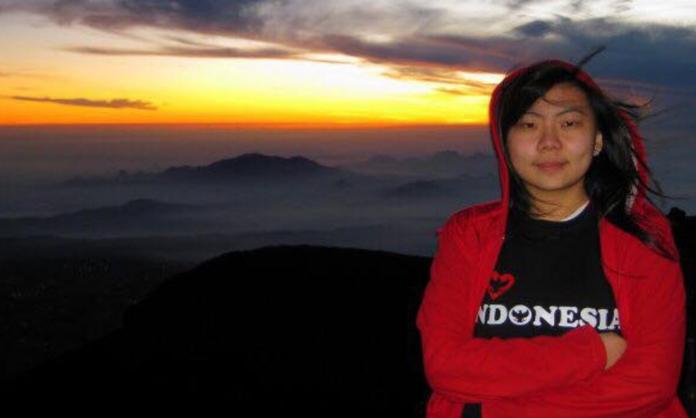Papuan activists have raised more than $70,000 to repay a government-sponsored scholarship received by exiled activist and human rights lawyer Veronica Koman, after the Indonesian government demanded that she return the money—a move she described as “financial punishment” for her West Papua advocacy work.
Koman’s supporters went to the Finance Ministry’s Endowment Fund for Education (LPDP) in central Jakarta on 16 September to hand over 3 million rupiah ($280) in cash along with an Indonesian flag, a copy of the West Papuan Special Autonomy Law and a receipt for the rest of the money—which was sent to the LPDP by bank transfer. Security guards refused to allow them in, saying nobody was at the office due to the city’s partial lockdown to curb the spread of the coronavirus.
“I feel disappointed with the LPDP office; we sent them a letter on 15 September. They didn’t respond to us when we arrived on the grounds that the office is closed”, Papuan human rights lawyer Michael Himan told journalists. Although the handover didn’t take place, Himan emphasised that the money had been repaid in full and sent to the LPDP by bank transfer. “This is a symbolic handover ... from the Papuan mama-mama [traditional Papuan women traders] that they sent to us”, he said.
Recently released Papuan political prisoner Ambrosius Mulait—one of the Jakarta Six imprisoned for “treason” in April—said that they have been raising funds as an act of solidarity with Koman. “Veronica is one of the people who have been [most] vocal in advocating Papuan issues, but because of her political stand and advocacy the government has asked her to return her scholarship. Meaning that indirectly the government has no interest in resolving the Papua problem”, Mulait told CNN Indonesia.
The fundraising campaign was launched on 12 August, a day after Koman announced on Twitter that the government had demanded she repay a 773.8 million rupiah ($72,900) scholarship for a master’s degree in law at the Australian National University in 2016.
The LPDP claims that she failed to return to Indonesia after completing her studies, breaching one of the scholarship’s requirements. But Koman notes that she returned in 2018 to join the Jayapura-based Human Rights Lawyers Association for Papua and provided pro bono legal services to Papuan activists in three separate trials in Timika, Papua, in April and May 2019. “The Indonesian government is applying this financial punishment as the latest attempt to pressure me into stopping my advocacy for human rights in Papua”, she told CNN Indonesia.
Amnesty International slammed the decision, calling on authorities to protect human rights defenders. “Instead of imposing a punishment, the Indonesian government should support [Koman’s] effort to expose alleged human rights violations in Papua”, said Amnesty International Indonesia executive director Usman Hamid. Hamid noted that many Indonesian scholarship recipients fail to return home after completing their studies but have not be subject to similar sanctions.
The Jakarta Post reported that fundraising campaigns were held in several parts of Papua, including Jayapura, Nabire, Dogiyai and Wamena, local Papuans hitting markets, street corners and social media to ask for donations. Photos on social media showed Papuans sitting in an open field with donated banknotes scattered on a mat.
Mulait said Papuans from other regions and communities outside the province also contributed. In some parts of Papua, solidarity actions were broken up by police. “Papuan donors in Jayapura and Nabire were disbanded by the authorities, while the solidarity action in Dogiyai and Wamena went well”, he told the Post.
It remains unclear if the government will accept the donations as payment. Suara.com quoted the LPDP as saying that it had received an email from Koman advising them of the payment but would have to study and verify the transfer first.
Koman has been in forced exile in Australia since September 2019, after Indonesian police placed her on a wanted person’s list on trumped-up charges of spreading misinformation and provoking unrest in Papua. She thanked those who contributed to the solidarity payment. “I am very moved and thankful”, Koman told Suara.com. “With this I want to emphasise that it means that my scholarship was not paid for by the Indonesian government but rather by the Papuan people.”
Koman said that the solidarity shown by the Papuan people has inspired her to continue dedicating herself to fighting for human rights in Papua. “Initially I felt down because of the non-stop persecution which has disrupted [my] advocacy work”, she told Tirto.id. “But this persecution has actually given me an opportunity to see that in fact my work is appreciated.” She added that, despite the many people who have accused her of being a traitor, “It turns out that I did the right thing in the eyes of most ordinary Papuan people”.
For the latest news and information on West Papua and Indonesia visit Indoleft and the Asia Pacific Solidarity website.










